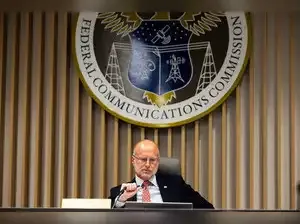The U.S. Federal Communications Commission on Thursday approved the merger between Paramount Global and Skydance Media, clearing the way for an $8.4 billion sale of some of the most prominent names in entertainment, including the CBS broadcast television network, Paramount Pictures, and the Nickelodeon cable channel.
The FCC agreed to transfer broadcast licenses for 28 owned-and-operated CBS television stations to the new owners after Paramount paid $16 million to settle a lawsuit filed by U.S. President Donald Trump over a "60 Minutes" interview with former Vice President Kamala Harris that aired in October.
FCC Chairman Brendan Carr has said the agency's review of the proposed merger was not connected to the civil suit.
The approval came after Skydance and its investment partner, RedBird Capital, assured the FCC of their commitment to unbiased journalism that represents diverse viewpoints. Skydance said it would appoint an ombudsman to evaluate complaints of editorial bias or other concerns about CBS in an effort to promote transparency and increased accountability.
Paramount also eliminated its diversity, equity, and inclusion initiatives to align with the Trump administration's view that such affirmative action policies are discriminatory.
Carr said he welcomed "Skydance's commitment to make significant changes at the once storied CBS broadcast network. In particular, Skydance has made written commitments to ensure that the new company's programming embodies a diversity of viewpoints from across the political and ideological spectrum."
Carr also hailed what he called a victory in "the FCC's efforts to eliminate invidious forms of DEI discrimination."
The FCC voted 2-1 to approve the deal, with Democratic FCC Commissioner Anna Gomez dissenting. "After months of cowardly capitulation to this Administration, Paramount finally got what it wanted. Unfortunately, it is the American public who will ultimately pay the price for its actions," she said.
She added "in an unprecedented move, this once-independent FCC used its vast power to pressure Paramount to broker a private legal settlement and further erode press freedom.... Even more alarming, it is now imposing never-before-seen controls over newsroom decisions and editorial judgment, in direct violation of the First Amendment and the law."
Skydance CEO David Ellison, son of Oracle co-founder Larry Ellison, is poised to become chairman and chief executive of the new Paramount. Jeff Shell, former chief executive of Comcast's NBCUniversal, will be its new president.
The transaction marks the end of an era for the Redstone family. Its paterfamilias, the late Sumner Redstone, transformed the family's chain of drive-in movie theaters into a media empire that once spanned broadcast and cable television, film, radio and publishing.
Shari Redstone served as Paramount's chair starting in 2019, when she reunited two family-controlled media companies, Viacom and CBS, which had been separated for more than a dozen years.
At the time, she hoped to better position the company to compete with the world's entertainment giants. Paramount has since shed billions of dollars in market valuation as it struggled to navigate an entertainment business upended by the streaming video revolution.
The FCC agreed to transfer broadcast licenses for 28 owned-and-operated CBS television stations to the new owners after Paramount paid $16 million to settle a lawsuit filed by U.S. President Donald Trump over a "60 Minutes" interview with former Vice President Kamala Harris that aired in October.
FCC Chairman Brendan Carr has said the agency's review of the proposed merger was not connected to the civil suit.
The approval came after Skydance and its investment partner, RedBird Capital, assured the FCC of their commitment to unbiased journalism that represents diverse viewpoints. Skydance said it would appoint an ombudsman to evaluate complaints of editorial bias or other concerns about CBS in an effort to promote transparency and increased accountability.
Paramount also eliminated its diversity, equity, and inclusion initiatives to align with the Trump administration's view that such affirmative action policies are discriminatory.
Carr said he welcomed "Skydance's commitment to make significant changes at the once storied CBS broadcast network. In particular, Skydance has made written commitments to ensure that the new company's programming embodies a diversity of viewpoints from across the political and ideological spectrum."
Carr also hailed what he called a victory in "the FCC's efforts to eliminate invidious forms of DEI discrimination."
The FCC voted 2-1 to approve the deal, with Democratic FCC Commissioner Anna Gomez dissenting. "After months of cowardly capitulation to this Administration, Paramount finally got what it wanted. Unfortunately, it is the American public who will ultimately pay the price for its actions," she said.
She added "in an unprecedented move, this once-independent FCC used its vast power to pressure Paramount to broker a private legal settlement and further erode press freedom.... Even more alarming, it is now imposing never-before-seen controls over newsroom decisions and editorial judgment, in direct violation of the First Amendment and the law."
Skydance CEO David Ellison, son of Oracle co-founder Larry Ellison, is poised to become chairman and chief executive of the new Paramount. Jeff Shell, former chief executive of Comcast's NBCUniversal, will be its new president.
The transaction marks the end of an era for the Redstone family. Its paterfamilias, the late Sumner Redstone, transformed the family's chain of drive-in movie theaters into a media empire that once spanned broadcast and cable television, film, radio and publishing.
Shari Redstone served as Paramount's chair starting in 2019, when she reunited two family-controlled media companies, Viacom and CBS, which had been separated for more than a dozen years.
At the time, she hoped to better position the company to compete with the world's entertainment giants. Paramount has since shed billions of dollars in market valuation as it struggled to navigate an entertainment business upended by the streaming video revolution.








